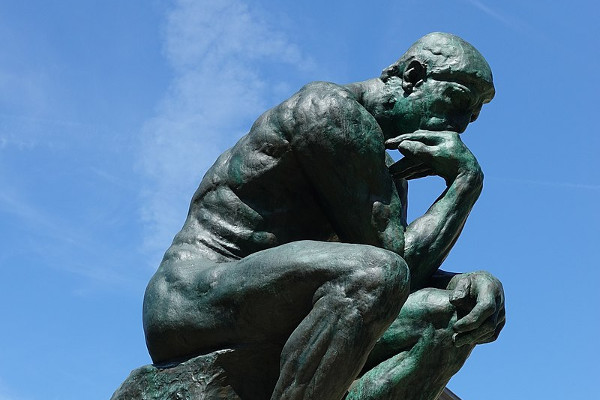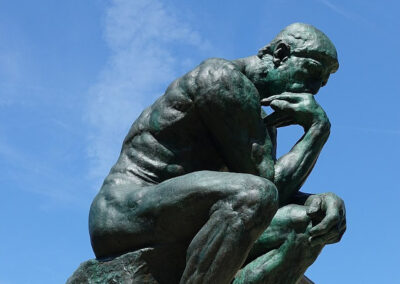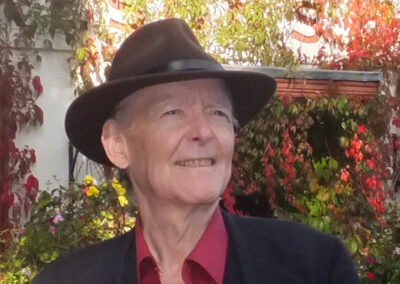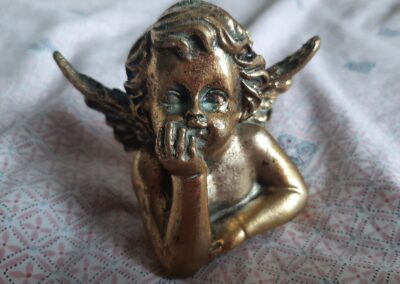Little of what follows is as easy as it might seem.
Reflection is a mental or cerebral state of mind. Mental attitude is in thought processes more than in a physical preparation. There should be an understanding that ‘reflection’ is an activity in itself that is to be valued and prepared for, not just a thing that anybody automatically does or can do without thinking, forethought or appreciation.
A change in perspective can have profound, beneficial, practical consequences.
There should be a wish to concentrate on things that matter to one. A wish for clarity of mind, as the Gayatri mantra advocates, should be included on one’s Wish List. The idea is by introspection without distraction to assess the overall, balanced picture.
A comfortable posture helps. Anything that negates negativity helps.
It is increasingly felt that positive thinking – sending of positive information to oneself – helps attract the positive energy of the universe.
There is no requirement to theorise.
It is a salve for angry, emotional thinking or behaving – an enemy within. To best fight that, as with any enemy, it should first be fully Identified. A determination to counter to a maximum degree being overwrought or consumed by practical difficulty is part of the preparation.
The wish to accomplish this or any task is half the battle to seeing it through to success. The clothing of what tends to be regarded as mental events in the imagery of practicality – as ‘a task’ rather than ‘an idea’ – is part of the mental preparation. There should be the deeply-felt wish to reach a calm balanced outlook. One seeks being happy in life, contentedness with one’s lot. Do you sincerely want this? ‘If at first you don’t succeed, try, try, try again!’
The smallest change in attitude in time can bring large changes in thinking and action.
Once the goal is clear, a path is signposted.
What is your best path? This question is one of many good starting points.
‘It takes something more than intelligence to act intelligently’, as Dostoyevsky said
Reflection as a predominating attitude seeks to reclaim mental terrain that used to be the norm of those who simply wished to Meditate. Not for our forebears wanting solace in mediation were there prescribed, variegated forms of body exercises. A nod in the direction of taking physical steps might be dressing up for church, settling down in a quiet nook or setting aside time for fruitful thinking even just rumination. Mental rather than physical preparation was and is advised to put one in the right frame of mind.
‘…Grant that this … day, given by Thy Fatherly kindness, be not lost to my fellow creatures or myself, may it be one of the useful days of my life …shield my heart from evil passions… endeavouring to exalt my mind and purify my soul …The mind… released from the material cares of life…, drawing that delicious sustenance from Thy Divine precepts which gives strength, wisdom and happiness…’
Suchlike thoughts are calming, without need for instance of going out of one’s way to, say, control one’s breath. The above lines are from a Judaic prayer and preparation for prayer but the drift is much the same as needed for reflection regardless of religion or spirituality. Great thinkers have covered most nooks of deepest thinking regardless of what garb or belief clothed their thought.
Whatever de-stressing turns you on to the right mental plane is for you to see. There are many suggestions given on this website. It will help you form the habit needed and we are creatures of habit. The story of a brilliant Cambridge scholar who prepared for critical exams by going fishing is not just apocryphal.
The precise form of words is not the crux. Any stance that is true for an individual in fundamentals is much the same. Words in themselves in any case hardly give one an idea of underlying reality and may be illusory. Knowledge of essential truth in any case is given to few, if any, to know.
Self-reliance and self-discipline are keys to the right-minded attitude. Some people may need more assistance, professional or empathetic, than others. Practice may be needed to achieve quietness of mind and a holistic way of looking at life. A detached perspective – your hard-won ideas rather than the hand-me-downs of other people’s’ thoughts, or taking for granted a background culture – is within your grasp.
Be a master, not a servant, of your own thinking as far as possible and you will be the happier for it and society will be the better for having you in it.
It needs unflinching honesty with oneself. Be honest with yourself; no one but you is listening. Reflection is a solitary occupation.
‘Practice’, it is said, ‘makes perfect’.
—
A person who wishes to reflect can choose his area of interest or concentration if it does not immediately suggest itself. At different times, ideas may change.
(a) Is your wish to reflect on your personal past? Reflecting on this sometimes may be likened to the charm felt by a tightrope walker who, after crossing an abyss, looks safely down into it or a long-distance runner in the changing room after his exertions who experiences a sense or surge of relief.
Was Socrates right in toto or in part to say: ‘the unexamined life is not worth living.’
(b) Do you want to ask ‘What is life about’? People often think along such lines in adolescence but why presume that we did all our fundamental thinking by the time we reach adulthood? It is a civilised thing to do, to ask oneself what one’s life, and the panorama of life, is about.
(c) Is it to consider what one wishes to achieve in life; and how to do it?
As with all illustrations on this website, the precept above is not inscribed on a tablet of stone. The question as always in this institute is: ‘Do you agree with it?’
(d) Do you want to think about your relationships with other people?
(e) Do you want to ‘Know thyself’, the injunction of the Delphic Oracle? This, again, is not as easy to accomplish as it might look.
(f) Do you want to consider any about yourself or anyone else?
If you ignore reality you should not ignore the consequences of ignoring reality.
The more one looks into almost any idea or task the more complex it can appear. The attainment of a settled view in which one can have confidence often comes through a careful consideration of it even if the end result may not be far from the starting point.
—
There is very much that has been written that can help induce an attitude of Reflection. The purpose of such texts may not have been specifically to reflect as such but they will help induce a state of reflection. Many of these passages in literature can be part of your ‘handbook’ to a contemplative mind. The best and most uplifting examples help anyone become better-balanced.
Think this through, quietly looking out for what is tailor-made for you.
What do you wish to reflect on?
What type of reflection will help best to get you to your chosen goal?
Reflection is a wide category. We all know what it is but do we do it; do we recognise the beneficial results and go out of our way to put them into practice?
To speak in broad category, there are two main types of reflection:
There is what might be termed a ruminant type of reflection. This is often with the purpose of trying to tease out what is really going on in the subconscious. That can be an effect even if it is spelled out as the intention. Carl Jung writes: ‘Until you make the unconscious conscious, it will direct your life and you will call it fate.’
There is interest in letting the mind wander this way and that, observing what emerges.
It is best if the conscious mind does not waive its nature or responsibilities. We are human first and foremost. If the mind is bolting or moving off in all directions rather like an unruly elephant, then the mahout, or elephant driver, should try and cajole it back on track. It is often the emotions that overwhelm and they are not conducive to calm reflection. If nothing else, they should be seen for what they are, again. Its best to master them if that is what is considered on reflection to be the best course. Aids to meditation, the soft music, the incense, the candles and so forth enumerated non-exhaustively in, say, the Sanctuary on this website may play a helpful role.
This is the state of mind most likely to breed the products of intuition; the ideas that come from ‘one knows not where’. This process is to be distinguished from that of ‘thinking’ (unless thinking is broadly defined).
Some intuitions vanish on surfacing, like dreams, some entrench themselves. See them for what they are, perhaps get them down on paper, thar they may best be inspected in the broad light of day.
There is a primarily cerebral type of reflection. We wish, say, to unravel a problem or come up with a solution as to which direction to take at a crossroads’ or at a deeper level come up with guidance as to how to live our lives. It can be about what type of a person we wish to become – on a day-to-day or more panoramic basis – or a general decision on what main course to follow in a specific context. Do we wish to change? Thought precedes action. We wish to think our way towards the right solution, a way forward in life. ‘Look before you leap’ is mantra of reflection.
Emotions need not be downgraded to an unimportant part of the mix. An emotional reaction is not necessarily wrong per se – though may depend on the type of emotion. Love is different from anger. We are human and so have emotions but at the end of the day the more undesirable of them ideally should be kept in check and fully justified not just ‘felt’. Anger is very rarely a good counsellor but, that said, sometimes a show of anger on a public stage may help push over an obstacle. Reflection should precede action. If the course of action decided is to follow this route – anger usually is a last resort – it will gain through a feeling of conviction that is buttressed by careful planning.
How to think about our destiny? One can feel that some deep things must be true; to be persuaded of their truth, especially with statements in conclusion, needs a degree of probing and consideration that tends to toward the cerebral. It is if to summon up an outsider – in oneself – to look in on the questions one throws up.
There should be as little distraction as possible. Avoidance of digression or misleading by-ways tends to take practice. People might be distracted by the roar of an aeroplane or loud music when, say, trying to solve a mathematics problem but anyone who has prepared for an exam knows the drill. Nerves and fear should be kept at bay. There is little point thinking about how good it would be to pass an exam when trying to tease out a solution to a problem in the exam paper. Concentrate on each step along the way. The goal that started you off originally might be to pass the exam but that isn’t the way to get a particular question right. But if you tell yourself when playing chess that getting a move right is a matter of life and death, you are less likely to make a mistake. It also helps to try and enjoy what you are doing.
Conclusion
Who are you, really? Which are the traits or different aspects of your ‘I’ that you would like predominate above others and be your better self, whoever it may be? Why are you here on this earth? Wouldn’t you like to know, or at least have some idea? How might your considered thinking affect how you live your life?








